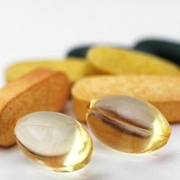Dietary Supplements With Aging
Although the diet can provide many essential nutrients as you grow older, there are some vitamins and minerals that you may need to take in supplement form. Some dietary therapists say that the modern diet and lifestyle exposes people to so many nutrient “depeleters” that supplements are the best way to achieve optimum nutrition.

Your Nutrient Needs: Deficiency in fat, carbohydrate or protein is very rare, but experts believe that many of us are lacking in vitamins and minerals. However, it is difficult to work out exactly which vitamins and minerals you recieve in abundance and those that you may need to supplement. The best advice is to consult a naturopath or dietician who will carry out a detailed analysis of your personal nutritional needs. Both your hair and blood can be analyzed to provide information about the nutritional state of your body. Even without professional assessment you can make a reasonable estimate of your needs by looking at the foods you eat in your diet and examining your lifestyle and current health. For example, if your diet includes many substances such as salt, sugar, caffeine and alcohol, that deplete the body of nutrients, then it maybe advisable to take a multivitamin and mineral supplement. Diet can sometimes be misleading though: you may eat healthy foods but still have problems absorbing all the nutrients you need for health. If you have a stressful lifestyle, smoke cigarettes, drink alcohol and are exposed to environmental pollution on a daily basis, then you are very unlikely to be getting all the vitamins and minerals that you need. If this is the case, taking daily supplements is probably advisable.

Your current health is often a good indication of whether you are suffering from sub-optimum nutrition or deficiency. Problems as diverse as mouth ulcers, muscle cramps, frequent colds, irritability and dry skin can often – but not always – be traced to a lack of essential vitamins and minerals.
Daily Nutrient Intake:
Recommended daily allowances (RDAs) are standard amounts set by governments. They represent the daily amounts of a nutrient that we should consume in order to stay healthy. RDAs are criticized by some dietary therapists who say that they are far too low. It is argued that, although an RDA is high enough to prevent a deficiency disease such as scurvy (caused by insufficient vitamin C), it is not high enough to keep the body functioning at an optimum level for health and wellbeing. Critics say that RDAs should be increased to encourage people to eat healthier diets.

What Are Supplements?
Supplements usually come in tablet form. They contain a stated amount of the essential nutrient plus other ingredients, such as fibre, bindings and coatings to give bulk, consistency and shape to the tablet. If you cannot tolerate cow’s milk, check that supplements are lactose-free. Follow the instructions regarding dosage carefully. Some supplements (usually vitamin C and B vitamin) work on a slow-release basis because they cannot be stored efficiently by the body. To avoid the product being excreted, slow release systems gradually release the nutrients, usually over a period of six hours, to allow maximum benefit. Liquid supplements often contain sugars and sweeteners, but are easily assimilated into the body. Always take a liquid supplement in the dosage stated and do not drink it directly from the bottle or guess the amount taken.

Which Supplements?
Some health problems become more common with age and they can be prevented or alleviated with supplements. Consult a nutritionist or dietary therapist if you are in any doubt which supplements to take in which dosage.
1.General prevention of aging and degenerative diseases: Vitamin A, C, E, betacarotene, selenium, zinc or a general antioxidant supplement.
2.Menopausal Symptoms: Evening primrose oil, vitamin C with bioflavonoids, vitamin E, or a general multivitamin and mineral supplement.
3.Prostate Problem: Saw palmetto (for enlarged prostate), general antioxidant supplement, or a general multivitamin and mineral supplement.
4.Osteoporosis: Bone mineral complex, vitamin C, or a general multivitamin and mineral supplement.
5.High Blood Pressure: Vitamin C, general antioxidant, or a general multivitamin and mineral supplement.
6.Diabetes: Vitamin C, B complex, zinc, chromium, or a general multivitamin and mineral supplement.
7.Arthritis: Vitamin C, vitamin B5, gamma-linolenic acid (GLA), eicosapentaenoic acid (EPA), Bone mineral complex, general antioxidant supplement, or a general multivitamin and mineral supplement.